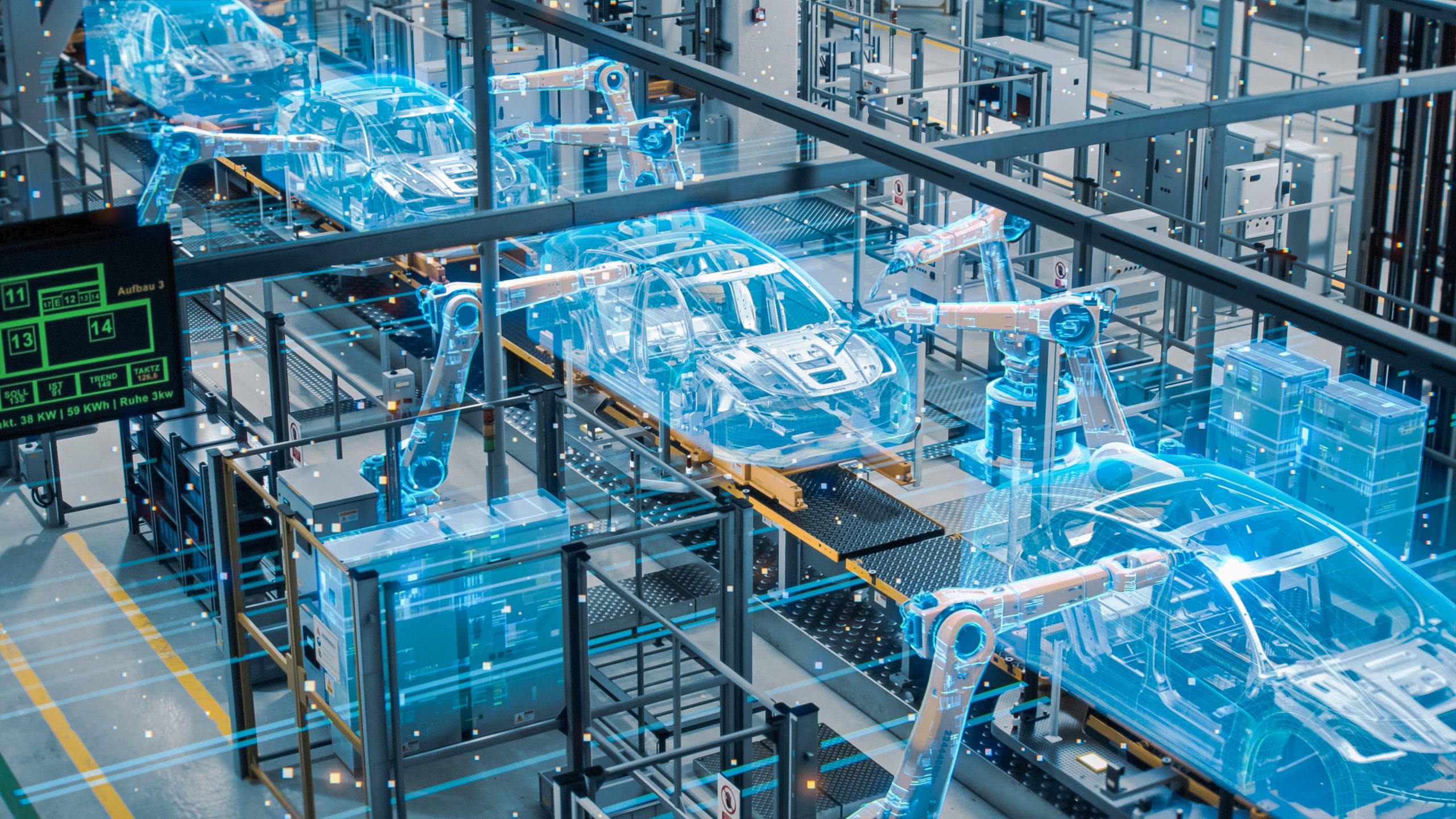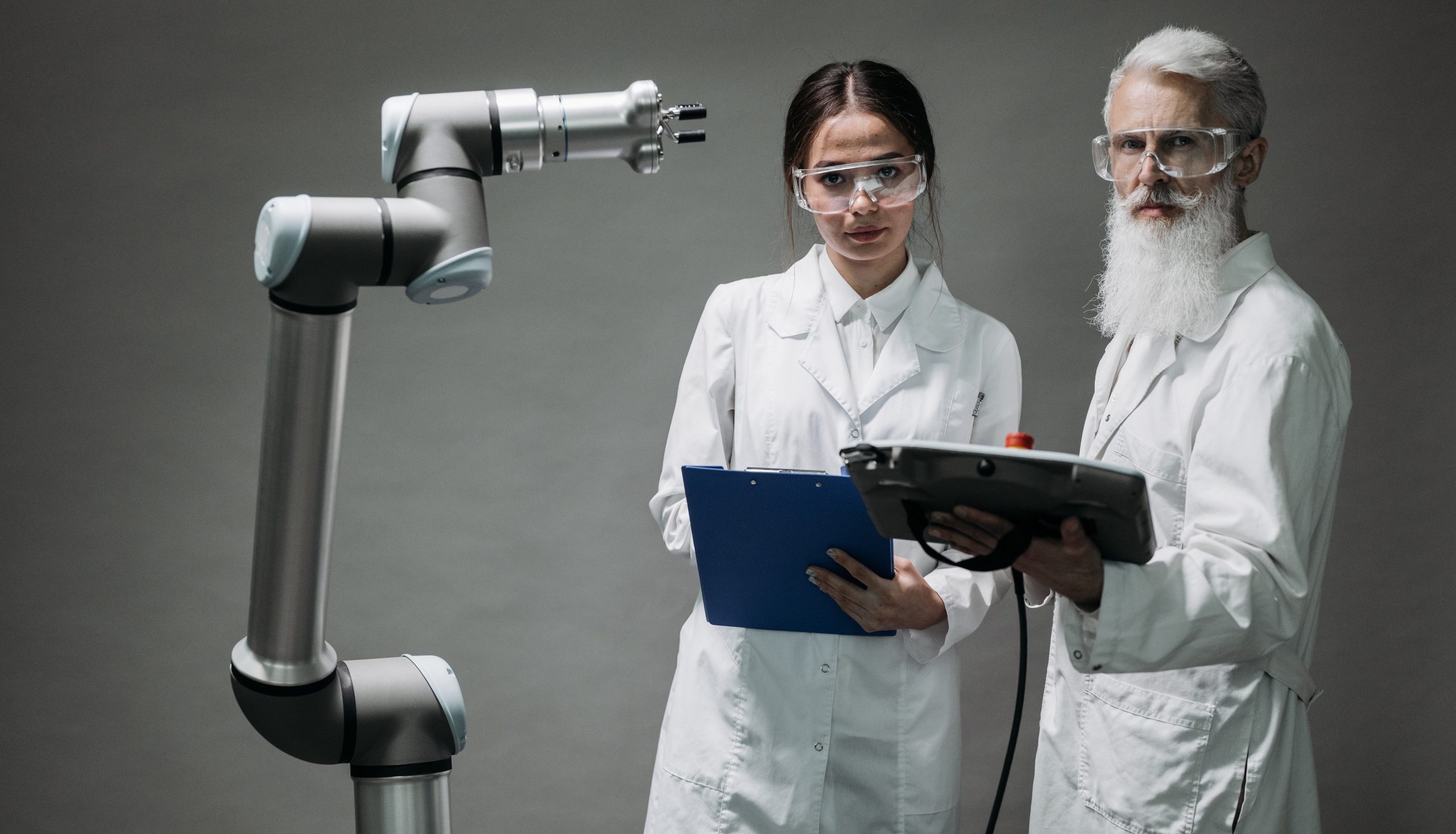AI for manufacturing to boost productivity
AI for manufacturing refers to the application of artificial intelligence technologies and algorithms in manufacturing to optimize production processes, improve efficiency, and streamline operations. Keep reading to find out how you can benefit from it.

Henry Kivimaa

Chances that you haven’t heard or read about artificial intelligence (AI) over the past year are slim. Every news outlet seems to be talking about how AI will either benefit all of us immensely or destroy humanity.
This post won’t dive into the doom and gloom, nor will it discuss the merits and dangers AI can pose to humanity in a philosophical sense. Instead, it will investigate how AI can benefit manufacturers and take a closer look at the areas AI can be implemented in manufacturing.
So let’s dive in to learn about AI for manufacturing companies.
What is AI?
AI, or artificial intelligence, refers to intelligent systems that can perform tasks and make decisions that typically require human intelligence.
It involves using algorithms and advanced technologies to enable machines to learn from data, recognize patterns, reason, and solve problems.
AI encompasses various subfields, such as machine learning, natural language processing, computer vision, and robotics, all aimed at creating intelligent machines that mimic or augment human capabilities.
AI for manufacturing, in numbers
- 83% of organizations believe AI will play a significant role in their digital transformation¹
- AI is expected to boost the global economy by $2.6 trillion to $4.4 trillion, annually²
- 24% of manufacturing companies use AI for assembly and quality testing³
- 79% of organizations have a live industrial AI or are piloting a project¹
- In 2018, only 9% of manufacturers had implemented AI for improved decision-making3
- The implementation of AI in manufacturing has the potential to boost labor productivity in China by as much as 27%⁴
- 91% of AI projects implemented by Chinese manufacturers failed to meet expectations⁵
What are the use cases of AI for manufacturing?
Now, you may read the brief definition above and think that while it all sounds interesting, besides robotics, there doesn’t seem to be much that can be transferred directly to manufacturing.
However, as it comes out, there are quite a few areas in manufacturing that can be improved by AI. So, let’s explore 8 of them.
1. Process automation and optimization
AI is employed to automate and optimize manufacturing processes, such as assembly line operations, material handling, and inventory management. By leveraging machine learning and robotics, AI systems can streamline tasks, reduce production times, minimize errors, and improve overall productivity.
2. Robotics and automation
AI-powered robotics and automation systems are revolutionizing manufacturing. Intelligent robots equipped with sensors and AI algorithms can perform complex tasks with precision and adapt to changing conditions. Collaborative robots (cobots) work alongside human workers, enhancing productivity, ensuring safer working environments, and enabling tasks that require precision and strength.
3. Predictive maintenance
By continuously monitoring equipment performance and analyzing historical data, AI algorithms can predict when a machine is likely to fail or require maintenance. Predictive maintenance enables manufacturers to schedule maintenance proactively, avoiding unplanned downtime, optimizing maintenance resources, and maximizing operational efficiency.
4. Quality control and defect detection
AI solutions for manufacturing play a crucial role in quality control by analyzing sensor data in real time and detecting anomalies. Machine learning algorithms can predict potential failures or defects, enabling early identification and prevention of issues. This helps manufacturers improve product quality, reduce waste, and ensure customer satisfaction.
Download your free production quality control checklist
Not quite ready for AI to take over your quality control procedures? Download this quality control checklist and use it to keep your production standards high.
5. Supply chain optimization
AI helps optimize supply chain management by analyzing data from various sources, including sales, inventory levels, and market demand. AI algorithms enable manufacturers to optimize production planning, inventory control, and distribution strategies, resulting in reduced costs, improved customer satisfaction, and efficient resource utilization.
6. Product design and customization
AI aids in product design and customization by leveraging machine learning algorithms and generative design techniques. It can analyze customer preferences, market trends, and performance data to generate innovative designs, optimize product features, and enable personalized manufacturing.
7. Manufacturing job scheduling
AI can optimize the scheduling of manufacturing jobs by considering various factors such as machine availability, worker skillsets, order priorities, and production constraints. By utilizing AI algorithms, manufacturers can efficiently allocate resources, balance workloads, minimize downtime, and improve overall production efficiency.
8. Energy efficiency and sustainability
AI helps manufacturers improve energy efficiency and sustainability by analyzing energy usage patterns, identifying areas of waste, and suggesting optimization strategies. By optimizing energy consumption and reducing environmental impact, AI contributes to sustainable manufacturing practices.
These use cases highlight the broad applications of AI for manufacturing, emphasizing its potential to enhance efficiency, quality, maintenance practices, and overall competitiveness in the industry.
How can manufacturing companies prepare for AI?

To prepare for AI implementation in manufacturing, companies can take the following steps:
- Educate and build awareness — Gain a deep understanding of AI technology, its capabilities, and potential applications within the manufacturing industry. Stay informed about the latest trends, research, and best practices.
- Assess organizational readiness — Evaluate the company’s current infrastructure, data management capabilities, and IT systems. Identify any gaps or limitations that need to be addressed before implementing AI. Assess the availability and quality of data required for AI algorithms.
- Identify suitable use cases — Identify specific areas within the manufacturing processes where AI can bring significant benefits. Determine the pain points, challenges, and opportunities that AI can address, such as process automation, quality control, predictive maintenance, or supply chain optimization.
- Develop a data strategy — Data is a critical component of AI. Define a strategy for collecting, managing, and storing relevant data. Ensure data quality and accessibility to support AI algorithms. Explore possibilities for data partnerships, sharing, or acquisition if needed.
- Invest in talent — AI implementation requires skilled professionals. Recruit or upskill employees with expertise in AI, machine learning, data analytics, and related fields. Build a multidisciplinary team capable of developing, deploying, and maintaining AI solutions.
Want to incorporate AI into your business?
Rainar, a Product Manager and an AI enthusiast from Katana, discusses how AI impacts businesses and how it can be implemented to improve manufacturing operations.

- Collaborate with experts — Seek partnerships or collaborations with AI experts, technology vendors, research institutions, or consultants. Leverage their expertise to accelerate the AI adoption process, validate ideas, and access specialized knowledge.
- Start with pilot projects — Begin with smaller-scale pilot projects to test AI applications and validate their effectiveness. Select use cases that have a high potential for success and can deliver tangible value. Learn from these pilots, iterate, and refine the AI solutions.
- Address ethical and security considerations — Understand and address ethical considerations related to AI implementation, such as privacy, bias, and transparency. Implement security measures to protect sensitive data and ensure compliance with relevant regulations.
- Secure executive support — Gain support and buy-in from top management to drive AI initiatives. Communicate the value proposition, potential benefits, and long-term vision of AI implementation. Allocate resources, budgets, and timelines accordingly.
- Embrace a culture of innovation — Foster a culture that encourages experimentation, learning, and innovation. Encourage employees to embrace AI technology, collaborate, and contribute ideas. Create an environment that supports continuous improvement and adapts to emerging AI trends.
Following these steps helps manufacturing companies lay a strong foundation for successful AI implementation, unlock the potential of AI-driven transformation, and stay competitive in an increasingly intelligent and automated industry.
HubSpot partner looking to expand your value offering?
Provide your clients with an end-to-end inventory solution that integrates seamlessly with HubSpot.
Cloud inventory platform for a unified experience
AI for manufacturing can boost efficiency and streamline operations by ensuring that all aspects of the production process work together at optimal capacity. While entrusting your entire business to AI might not be the preferred approach for everyone, there are alternative options available.
One such option is Katana, a cloud inventory platform designed to seamlessly integrate with your favorite business tools, including QuickBooks Online, Shopify, and WooCommerce. Integrating your software with Katana ensures that all your critical information remains synced across multiple platforms.
Katana offers a comprehensive set of features that empower manufacturers to easily manage their inventory, production scheduling, and order fulfillment. With real-time visibility into stock levels, production progress, and order status, you can make informed decisions and proactively address any bottlenecks or delays in the production process. Furthermore, Katana’s intuitive user interface makes it accessible to manufacturers of all sizes and levels of technical expertise.
In addition to these core functionalities, Katana now includes Katana AI (KAI), offering several AI-powered features designed to enhance sales and operational efficiency:
- Sales order assistant — Handling sales orders manually can be tedious and error-prone, especially when requests come in different formats, such as emails or receipts. KAI automates this process by reading unstructured data from incoming purchase requests and converting it into a quote-status sales order in Katana, reducing manual data entry and streamlining order management.
- Sales widget — Often, users opening their sales order list need better insight into their business’ operational and strategic status. The new sales widget provides a quick overview with pre-aggregated data points from KAI, offering essential insights to improve decision-making without needing external data sources.
- Sales insights — Users have expressed interest in a more customized data experience within Katana. With this feature, they can filter, sort, and even prompt KAI for data visualizations. For instance, asking, “Show me revenue trend,” would generate a line chart of monthly revenue, empowering users with immediate, visual insights.
By utilizing Katana, manufacturers can enjoy the benefits of a sophisticated manufacturing platform that optimizes production processes, reduces lead times, and enhances overall efficiency while leveraging familiar tools and systems. Embrace the potential of manufacturing software like Katana to streamline operations, improve collaboration, and achieve greater control over manufacturing processes. With Katana as your ally, you can focus on driving your business forward, knowing that your operations are running smoothly and efficiently.
Sources
¹New AspenTech Research Reveals the State of Industrial AI, AspenTech (2021)
²The economic potential of generative AI: The next productivity frontier, McKinsey (2023)
³An introduction to implementing AI in manufacturing, PwC (2020)
⁴How Artificial Intelligence Can Drive China’s Growth, Accenture (2017)
⁵AI Enablement on the Way to Smart Manufacturing, Deloitte (2020)

Henry Kivimaa
Table of contents
checklist
Download the production quality control checklist
Get inventory trends, news, and tips every month
Get visibility over your sales and stock
Wave goodbye to uncertainty with Katana Cloud Inventory — AI-powered for total inventory control